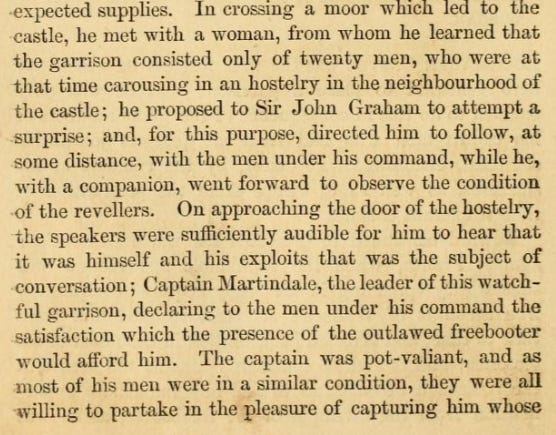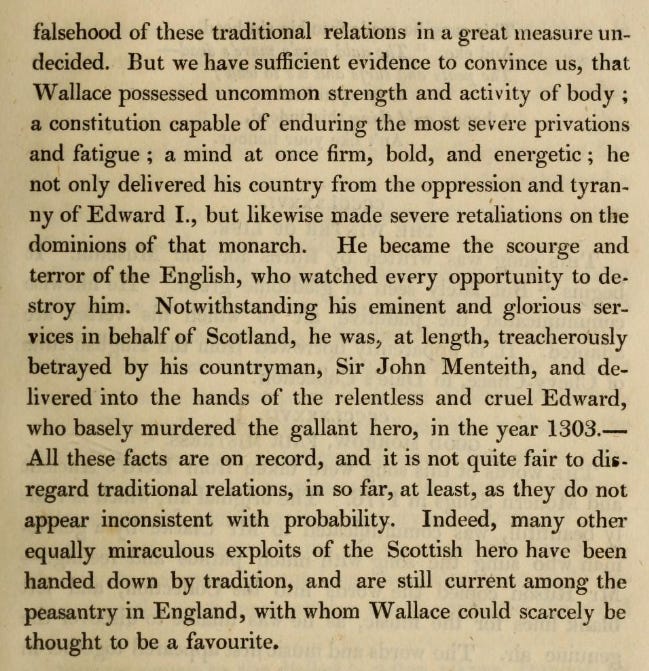
Little is known of the early life of William Wallace, and the fragments of evidence that exist are highly contested. He emerged in contemporaneous accounts as a fully formed fierce warrior for Scottish Independence, terrorizing English colonisers in the late 13th and early 14th century, until his capture and grisly execution by forces loyal to King Edward I.
One of the main sources for stories about Wallace’s exploits is an epic poem The Actes and Deidis of the Illustre and Vallyeant Campioun Schir William Wallace, more conveniently known as “The Wallace”, written by mysterious poet Blind Harry in the 15th century, some 172 years after Wallace’s death. A largely fictionalized eulogy to the hero Wallace, in a time where anti-English sentiment was running high, this was, after the Bible, the second most popular book in Scotland for several hundred years. (See Sources section for link.)

As for this ballad (which might be classified as an “outlaw ballad”), the events of Wallace disguising himself and slaughtering 15-30 arrogant Englishmen in a pub are recounted in slightly differing but fairly faithful retellings of Blind Harry’s poem. There is no way of validating the historical accuracy of the encounter, but in Medieval Scotland, nationalist skirmishes in alehouses must have been even more common than today.
Music
There are two tunes known for this, one of which was collected by Robert Burns and published in the epic six volume “The Scots Musical Museum”, published between 1787 and 1803, a project started by publisher James Johnson, with considerable contributions from Robert Burns. The other was collected by Scottish antiquarian C.K. Sharpe, operating around the same time.
The fact that they bear no resemblance to one another, and the lack of any tunes being recounted thereafter, is a good indication that this ballad has no real singing tradition. In fact, the only officially recorded sung version I can find (apart from the indefatigable singer of every Child ballad Raymond Crooke) is from this 1959 album from Arctic marine biologist and part time folk song collector Max Dunbar:
Thanks to the scrupulous digitisation practices of the mighty Folkways imprint, the sleeve notes are downloadable from the link above. They include Dunbar’s potted history of Wallace and a brief historical context of the war for Scotland’s independence. Dunbar also confirms that he used the Burns tune, as collected in “The Scots Musical Museum” mentioned above.
Other than that, the only recordings I can find are recitations of the poem to a musical backing, such as this from Australian-based Scotsman Andrew McKinnon’s celebration of Scots traditional music, a high budget theatre show that toured extensively in Australia in the early 21st century.
Also of interest is this recitation from Hamish Henderson’s 1956 recording of Alan Lamb, who could only recall a small fragment of the tale, which seems to come from [Child version F]. This is possibly an indication that Gude Wallace has survived more in the form of a patriotic poem than a melodic song.
Sources
As noted above, the very likely primary source material for this ballad comes from the third chapter of the fifth book of Blind Harry’s epic poem about the life of Wallace:
You can read it yourself here. Unsurprisingly for a 15th century text, it is somewhat hard going for the modern reader. In 1858 the Thomas Murray published a popular account of Wallace’s life that makes for easier reading - here is the relevant section:
At the end of the 18th century, the ballad form of this story came to light via Scottish engraver and publisher James Johnson in his epic collection of ballads “The Scottish Musical Museum” - his account is of interest for a number of reasons, the main one being his tempation to view the similarity with the Blind Harry story as corroborative evidence for the story, rather than Harry’s poem being used as a source for the ballad, which I think would be the more natural conclusion today.
19th century literary all-rounder William Edmondstoune Aytoun wrote in his 1858 “The Ballads of Scotland” how he prefers the version William Motherwell collected around 1825 from “an old woman in the neighbourhood” of Peterhead.
Draft pages and audio guide
Keep reading with a 7-day free trial
Subscribe to Sing Yonder: A Practical Guide to Traditional Song to keep reading this post and get 7 days of free access to the full post archives.









